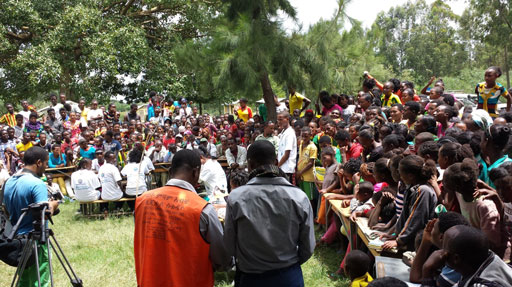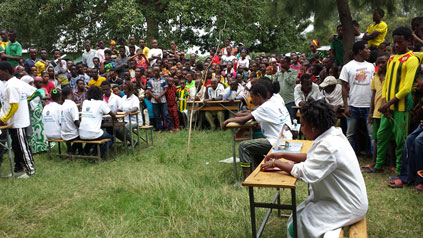11.4.1 Role of schools
You learned in Study Session 6 about the importance of engaging school children in WASH initiatives. In school, children gain knowledge that can influence and stimulate their attitude and practice, help them to develop their life skills and play an important role in influencing their families and the wider community. However, the existing water supply and sanitation conditions of many of the schools in urban and peri-urban parts of Ethiopia are alarmingly inadequate and unsafe. Most of the school latrines are filthy, and their poor condition is contributing to a high level of disease, creating a poor learning environment. The lack of adequate facilities is a particular problem for girls’ education, as you read in Case Study 10.2 on menstrual hygiene. It is important for the community to be involved in planning WASH facilities, especially in schools (Figure 11.4).

School children who are loved and trusted by their families and communities may be effective agents of change in their localities, particularly in the use and management of water supply and sanitation facilities, if they are guided appropriately in school. School teachers and school WASH clubs can therefore play a crucial role in promoting better hygiene practices among school children and better management of WASH facilities. This has a great impact not only in influencing the delivery of quality education, but also as a strategy for spreading the WASH technologies and the changes required by the community, and hence contributing towards a positive social change in their localities.
As a WASH practitioner you are expected to understand the advantages of working closely with school WASH clubs and bringing about a change in hygiene behaviour focused on school children, who are the future of the country.
Effective sanitation and hygiene education in a school should include:
- A healthy physical environment:
- Keep the school compound and classrooms clean and free of waste of all types.
- Latrines that are appropriately designed for children (boys and girls).
- Convenient handwashing facilities.
- Safe drinking water.
- Active and organised children:
- Careful use of facilities by all children and also by teachers.
- Consistent and organised cleaning and maintenance of latrines and also of handwashing and drinking water facilities with active participation of the students.
- Roles for older children to help supervise and monitor younger children when using facilities and maintaining school cleanliness.
- Trained and committed school personnel:
- Appropriately trained head teacher and other key teachers.
- Relevant child-centred learning environment.
- Organised plans for children to help with use, monitoring and maintenance of facilities and learn good personal hygiene, e.g. through school WASH clubs.
- Links to home and community:
- Ensure that key health and hygiene information and behaviours flow back to the home.
- Organise WASH outreach activities in the community and carry out extension activities such as dramas, poetry recitals and demonstrations (see Figure 11.5).
- Encourage families and the community to provide finance and other support for maintenance and repair of school facilities.

11.4 Involving local groups
